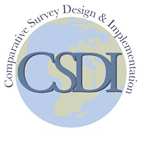- Home
- About us
- Initiatives
- Events
- 2024 CSDI Workshop
- Past Events
- 2023 CSDI Workshop
- 2022 CSDI Workshop
- 2021 Virtual CSDI Workshop
- 2019 CSDI Workshop
- 2018 CSDI Workshop
- 2017 CSDI Workshop
- 2016 3MC Conference
- 2015 CSDI Workshop
- 2014 CSDI Workshop
- Archive
- Forum
- Additional Resources
- Contact Us


Using Cross-Cultural Cognitive Pretesting for Questionnaire Testing
Cognitive Pretesting of Sensitive Questions for Cross-Cultural Surveys: Methods and Challenges
Patricia Hadler, GESIS – Leibniz Institute for the Social Sciences
Mixed-Method Approach for Understanding Scale Performance in a 3MC Context
Kristen Miller, National Center for Health Statistics
Considerations for Cross-Cultural Questionnaire Testing and Lessons Learned
Patricia Hadler and Natalja Menold, GESIS – Leibniz Institute for the Social Sciences
Questionnaire Design
Ingroup Bias and Its Implications for Using Visual Images in Computerized Surveys
Sunghee Lee, University of Michigan
Measuring Subjective Health and Life Satisfaction with U.S. Hispanics
Sunghee Lee, University of Michigan
Data Quality and Comparability in Survey Data Harmonization
Comparing Two Measures of Education Harmonized Ex Post: Levels of Education and Years of Schooling
Marta Kołczyńska, Institute of Philosophy and Sociology, Polish Academy of Sciences
Inter-survey Variability of Corruption Measures: Implications of Harmonization Procedures
Ilona Wysmułek, Institute of Philosophy and Sociology, Polish Academy of Sciences
Validity and Comparability of the Education Measures in the European Values Study 2008
Verena Ortmanns, GESIS-Leibniz Institute for the Social Sciences
Looking for Ways to Characterize Countries Politically and Economically using Longitudinal Data
Claire Durand, Université de Montréal
Comparative Standard Demographics
When Standard Wording for Language Spoken at Home does not Work Standardly across Languages
Marjorie Hinsdale-Shouse, RTI International
Survey Experiments on Income Non-Response in Cross-National Surveys
Steve Schwarzer, Pew Research Center
Questionnaire Translation in Theory and Practice: Challenges, Solutions – and New Ideas?
Translating Questionnaires for Cross-national Surveys: A Text Genre and its Particularities
Dorothée Behr, GESIS-Leibniz Institute for the Social Sciences
TMT: Questionnaire Translation Management for Large International Studies. Lessons Learned and Challenges Ahead
Brita Dorer, GESIS-Leibniz Institute for the Social Sciences
Memory Lane – A Repository and Online Search Engine of Legacy Materials in Large-scale Multilingual Surveys
Andrea Ferrari and Manuel Souto Pico, cApStAn
SERISS Experiment for Testing Close versus More Adaptive Questionnaire Translation Approaches: First Results from the Translation Sessions and from the Field
Brita Dorer, GESIS-Leibniz Institute for the Social Sciences
Training Translators for a Multi Country Study: Lessons Learned
Alisú Schoua-Glusberg, Research Support Services
Interviewer Falsification
Interviewer Effects and Undesirable Interviewer Behavior
Ineke Stoop, The Netherlands Institute for Social Research/SCP
Identification of Falsifications in Surveys – a Link to the Cross-Cultural Context
Natalja Menold, GESIS – Leibniz-Institute for the Social Sciences
Issues of Privacy and Legal Restrictions around Survey Research
Third Parties in Face-to-Face Interviews: Qualitative Insights from 4 African Countries
Leenisha Marks, RTI International
Investigating Face-to-Face Interview Privacy Perceptions and Preferences
Zeina Mneimneh, University of Michigan
Freedom to Publish Public Opinion Research: Findings from a 2017 Worldwide Survey
Tim Johnson, University of Illinois at Chicago
Sampling Approaches in Cross-Cultural Research
Sampling Schemes and Survey Quality in Cross-national Surveys
Marta Kołczyńska, Institute of Philosophy and Sociology, Polish Academy of Sciences
OnDemand Sampling Hub for CATI Projects Globally
Carsten Broich, Sample Solutions BV
Using Big Data to Sample Ethnic Minorities in Western European Countries: Muslims
Carsten Broich, Sample Solutions BV
Strategies to Reduce Nonresponse in Cross-cultural Surveys
Worth the effort? An Examination of Recontact Strategies in F2F and Telephone Surveys
Steve Schwarzer, Pew Research Center
Boosting Response and Minimizing Selection Bias: Recent Experiments Carried out in a Push to Web Survey across Europe
Tanja Stojadinovic, Ipsos MORI
Quality in Cross-cultural Surveys
Improvements in Survey Quality over Time: Lessons Learnt from Eurofound’s Pan-European Surveys Since 1995
Daphne Ahrendt and Sophia MacGoris, Eurofound
Assessing Quality of Survey Processes and Outputs: The 4th European Quality of Life Survey
Julie de Jong and Kristen Cibelli Hibben, University of Michigan
Paradata Use in Cross-cultural Surveys
Use Item-Level Timestamp Paradata for Multi-Country Comparison
Shulin Jiang, Johns Hopkins School of Public Health, Department of Population, Family and Reproductive Health, Gates Institute
Using Paradata to Monitor Interviewers’ Instrument Navigation Behavior and Inform Instrument Technical Design: Case Studies from a National Household Surveys in Ghana and Thailand
Yu-chieh Jay Lin, University of Michigan
Improving Cross-National Survey Research by More Coordination and Collaboration across Comparative Survey Research Projects
Considering Cooperation Beyond Europe. Opportunities and Challenges for the European Social Survey
Rory Fitzgerald, City University London
Comparative Studies: A Proposed Agenda for Future Collaboration
Lars Lyberg, Inizio
Response Quality
Identifying of and Dealing with Item Nonresponse in Open-ended Questions in a Cross-national Context
Katharina Meitinger, GESIS-Leibniz Institute for the Social Sciences
Questionnaire Answer Agreement: A Method to Detect Lurking Problems and Increase Data Quality
James Pringle, Johns Hopkins University Bloomberg School of Public Health
Mixed Methods and Survey Modes
Using In-depth Interview at Interviewees’ Homes with Nationwide Quantitative Survey for Understanding Southeast Asian Lifestyles
Midori Aoyagi, National Institute for Environmental Studies
What Mobilemanaging Phone Survey Mode Produces the Most Representative Data? A Comparison of SMS, IVR, and CATI in Nigeria
Leenisha Marks, RTI International
Data Collection Challenges
A Mechanism for Understanding the Effects of Repeated Survey Research on Communities: Findings from a Qualitative Study of PMA2020 Surveys in Burkina Faso
Shani Turke, Johns Hopkins Bloomberg School of Public Health (JHSPH), Gates Institute
Managing Production and Quality issues in Large Scale International Assessments
Dealing with a Rare Target Population: Out-of-School Youth Survey of PISA-D in Paraguay
Veronica Heilborn, Directorate for Evaluation of Quality of Education, Ministry of Education and Science (Paraguay)
Innovative Approaches in Survey Implementation – Overcoming Data Collection Challenges in U.S. PIAAC
Nina Thornton, Westat
Looking Back and Looking Forward: From PIAAC and PIAAC-Longitudinal in Germany to PIAAC Cycle 2
A Zabal, GESIS – Leibniz Institute for the Social Sciences